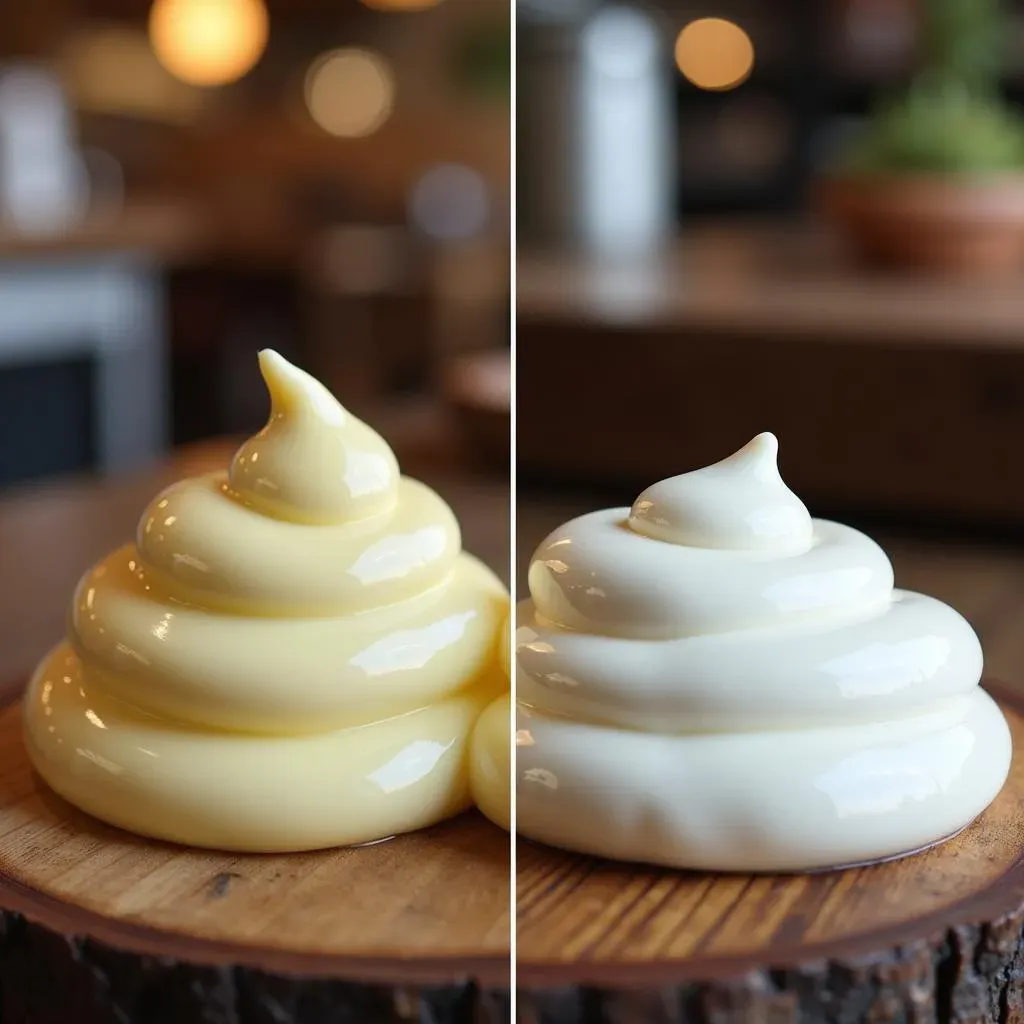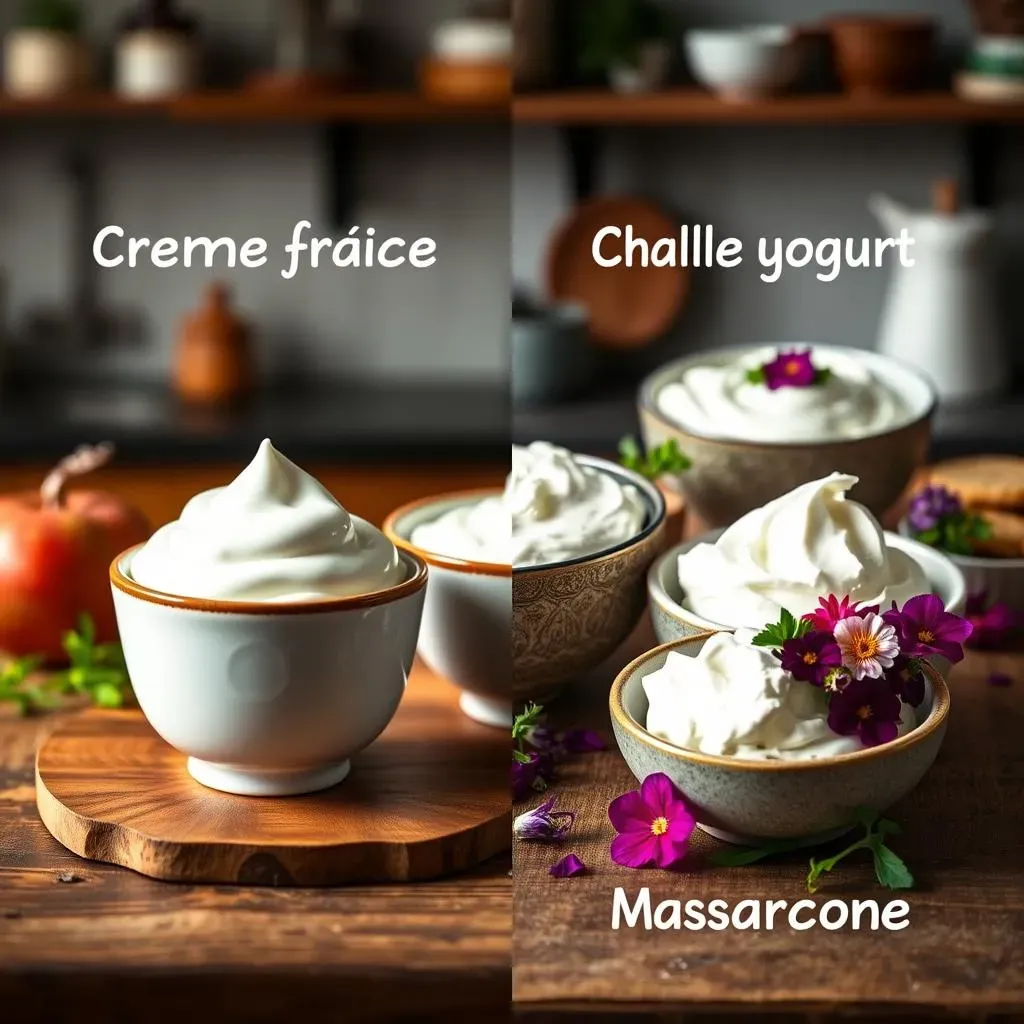Table of Contents
Ever stared blankly at a recipe calling for crème fraîche, only to realize your fridge is sadly crème fraîche-free? Don't panic! We've all been there. This article tackles the burning question: "can I substitute sour cream for crème fraîche?" We'll dive headfirst into the world of cultured dairy, exploring the subtle (and sometimes not-so-subtle) differences between these creamy cousins. First, we'll get to know crème fraîche and sour cream a little better, comparing their textures, flavors, and fat contents. Then, the main event: we'll explore whether sour cream truly holds up as a crème fraîche stand-in, examining the potential pitfalls and triumphs of this substitution. We'll also introduce some alternative substitutes if sour cream isn't your jam. Finally, we'll equip you with practical tips and tricks to ensure your culinary creations remain creamy, delicious, and utterly unforgettable, regardless of your chosen dairy champion. Get ready to become a crème fraîche substitution expert!
Understanding Crème Fraîche and Sour Cream: A Dairy Showdown

Understanding Crème Fraîche and Sour Cream: A Dairy Showdown
Let's get down to the creamy nitty-gritty! Crème fraîche and sour cream, while both delicious cultured dairy products, aren't identical twins. Think of it like this: they're siblings, sharing some family resemblances, but with distinct personalities. Crème fraîche, the sophisticated French cousin, boasts a higher fat content, typically around 30%, resulting in a richer, thicker texture. Its flavor is subtly tangy, more delicate than its American counterpart. Sour cream, on the other hand, usually clocks in around 18-24% fat, giving it a slightly thinner consistency and a more pronounced tang. This difference in fat content is crucial when considering substitutions, as we'll see later. Imagine trying to substitute a thick, luxurious dollop of crème fraîche with a much thinner sour cream – it might not quite hit the mark in terms of texture. You can learn more about substituting other ingredients for sour cream by checking out this cream cheese substitute guide or this guide on using plain yogurt instead.
Feature | Crème Fraîche | Sour Cream |
|---|---|---|
Fat Content | ~30% | 18-24% |
Texture | Thick, Rich | Thinner, Tangier |
Flavor | Subtly Tangy | More Pronounced Tang |
One key difference lies in how they behave when heated. Crème fraîche tends to hold its shape better under heat, while sour cream is more prone to curdling. This is again largely due to the fat content. Higher fat content means more stability. So, if your recipe involves cooking, crème fraîche might be the better choice for a smoother, less grainy final product. For baking, however, the difference is often less noticeable. Need to substitute buttermilk? Check out our article on using sour cream for buttermilk. Thinking about using sour cream in mashed potatoes? We have a guide for that too: sour cream in mashed potatoes.
- Crème fraîche is generally richer and thicker.
- Sour cream has a more pronounced tang.
- Fat content significantly impacts texture and behavior when heated.
The Great Crème Fraîche Substitute Debate: Sour Cream and Beyond

The Great Crème Fraîche Substitute Debate: Sour Cream and Beyond
Sour Cream: A Viable Stand-In?
So, can you swap sour cream for crème fraîche? The short answer is: sometimes. It depends heavily on the recipe. For cold applications like dips or toppings, a one-to-one substitution often works fine. The tangier flavor of sour cream might even add a pleasant twist. But remember, sour cream's lower fat content means it'll be thinner. If you're aiming for that rich, luxurious texture of crème fraîche, sour cream might fall short. Think of it like this: you wouldn't substitute skim milk for heavy cream in a rich chocolate sauce, right? The results would be… underwhelming. This is especially true in recipes where the cream is a key textural component.
- Cold applications: often a good substitute.
- Hot applications: risk of curdling.
- Texture difference: sour cream is thinner.
If you're working with a recipe that requires a significant amount of cream and heat, you might want to consider alternatives. For instance, if you’re making a sauce, you might find that sour cream curdles when heated. This is because the lower fat content makes it less stable at higher temperatures. Check out this helpful guide on using sour cream in mashed potatoes to see how it compares to butter.
Beyond Sour Cream: Exploring Other Options
Let's say sour cream isn't quite cutting it for your recipe. Fear not! The world of creamy dairy substitutes is vast and varied. Full-fat Greek yogurt, for example, offers a tangy kick and a thicker consistency than regular sour cream, making it a reasonable alternative in some cases. However, its tang might be more assertive than crème fraîche's subtle sourness. Another option is mascarpone cheese, a luscious Italian cream cheese that’s particularly well-suited to desserts. Its sweetness contrasts sharply with the tanginess of both crème fraîche and sour cream, so consider the overall flavor profile of your recipe before making this swap. Looking for a more comprehensive guide on sour cream substitutes? Check out our ultimate guide: ricotta cheese for sour cream.
Substitute | Best Use Cases | Considerations |
|---|---|---|
Full-fat Greek Yogurt | Dips, sauces (cold) | Stronger tang than crème fraîche |
Mascarpone | Desserts | Sweet, not sour |
Ultimately, the best substitute for crème fraîche depends on the specific dish. Consider the desired texture, flavor profile, and whether the recipe involves heat. Experimenting is half the fun! Remember, culinary creativity often involves a little improvisation. Don't be afraid to try different options and see what works best for you. Perhaps you might even discover your new favorite creamy ingredient. Looking for more information on using Greek yogurt as a substitute? This article on Greek yogurt in recipes may be helpful.
Cooking with Substitutions: Tips and Tricks for Success

Cooking with Substitutions: Tips and Tricks for Success
Cooking with Substitutions: Tips and Tricks for Success
So, you've chosen your substitute – fantastic! Now, let's make sure it shines in your recipe. Remember, even the best substitute might need a little tweaking to achieve optimal results. For instance, if you're using full-fat Greek yogurt instead of crème fraîche in a sauce, you might need to add a touch more lemon juice to compensate for the difference in tang. Similarly, if using sour cream in a baked good, you might want to reduce the overall liquid slightly, as sour cream is a bit thinner. Always start by adding a smaller amount of the substitute than the recipe calls for, and taste as you go. Don't be afraid to adjust seasonings to balance the flavors. A pinch of salt, a squeeze of lemon, or a dash of your favorite spice can make all the difference.
- Start with less substitute than the recipe calls for.
- Taste and adjust seasonings as needed.
- Consider the moisture content of your substitute.
When dealing with heat, proceed with caution. As mentioned earlier, sour cream is more prone to curdling than crème fraîche. To minimize this risk, add it towards the end of the cooking process, when the heat is lower, or whisk it in gradually while the mixture is still warm but not boiling. Need a guide on using sour cream as a buttermilk substitute in baking? Check out our article on sour cream for buttermilk in baking. If you are using sour cream in a dish that will be chilled, like a dip, you can usually just substitute it directly without any problems. If you’re using it in something that’s going to be heated, you might want to do a test run to see how it behaves.
Ingredient | Tip for Success |
|---|---|
Sour Cream | Add at the end of cooking or whisk in gradually. |
Greek Yogurt | Adjust lemon juice for tang balance. |
Mascarpone | Consider the sweetness level of your recipe. |
Ultimately, successful substitution is a blend of understanding the ingredients and embracing a bit of culinary experimentation. Don't be afraid to stray from the recipe slightly; sometimes, the best results come from happy accidents! Remember, cooking should be fun, so relax, enjoy the process, and don't be afraid to get creative. Need more tips on using sour cream? Our comprehensive guide on sour cream substitutions has you covered.
"The most important ingredient is always love." - Julia Child